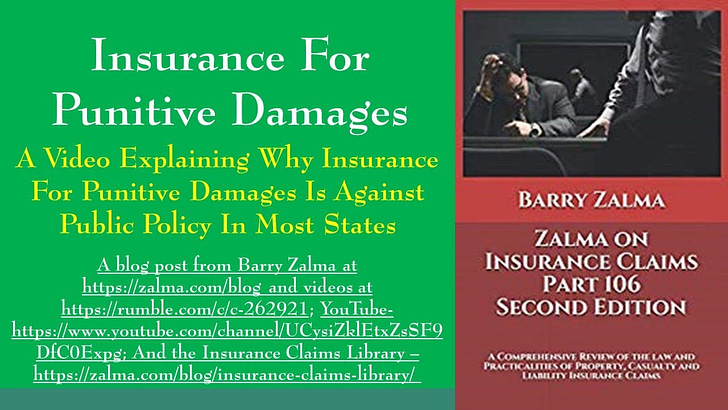Insurance for Punitive Damages
A Video Explaining Why Insurance for Punitive Damages is Against Public Policy in Most States
Read the full article at https://www.linkedin.com/pulse/insurance-punitive-damages-barry-zalma-esq-cfe and see the full video at https://rumble.com/viknsj-insurance-for-punitive-damages.html and at
and at https://zalma.com/blog plus more than 3750 posts.
Insurers generally argue that they cannot indemnify or insure for punitive damage awards. Insurance carriers typically rely, in California, on “public policy” and point to California Insurance Code Section 533. Section 533 states:
An insurer is not liable for a loss caused by the willful act of the insured; but he is not exonerated by the negligence of the insured, or of the insured’s agents or others.
Insurance carriers frequently cite Peterson v. Superior Court, 31 Cal.3d 147 (1982), in support of their argument. The Peterson court addressed the question of whether “imposition of punitive damages negates an insured’s coverage for compensatory damages as well as punitive damages.” It stated that “indemnification of the punitive damages is disallowed for public policy reasons.”
Many courts have recognized that the California Insurance Code Section 533’s bar against coverage does not apply when an insured’s liability is based on the acts of its agents, employees or representatives, at least absent evidence that the insured (or, in the case of a corporation, its board of directors) authorized or ratified the intentionally wrongful conduct.
For example, in Arenson v. National Automobile & Casualty Insurance Co., 45 Cal.2d 81 (1955), the insured’s son, a minor, started a fire that damaged school property, and the school district obtained a judgment against the plaintiff for the amount of the damage. The carrier refused to defend the suit or to pay the amount of the judgment, claiming that the injury was caused intentionally by an insured and therefore fell within an intentional acts exclusion or alternatively, Section 533. The court held: “Section 533 … has no application to a situation where [the insured] is not personally at fault.” It apparently ignored the fact that a minor child living with his parents is also an insured.
© 2021 – Barry Zalma
Barry Zalma, Esq., CFE, now limits his practice to service as an insurance consultant specializing in insurance coverage, insurance claims handling, insurance bad faith and insurance fraud almost equally for insurers and policyholders. He also serves as an arbitrator or mediator for insurance related disputes. He practiced law in California for more than 44 years as an insurance coverage and claims handling lawyer and more than 52 years in the insurance business. He is available at http://www.zalma.com and zalma@zalma.com.
Mr. Zalma is the first recipient of the first annual Claims Magazine/ACE Legend Award.
Over the last 53 years Barry Zalma has dedicated his life to insurance, insurance claims and the need to defeat insurance fraud. He has created the following library of books and other materials to make it possible for insurers and their claims staff to become insurance claims professionals.
Go to the podcast Zalma On Insurance at https://anchor.fm/barry-zalma; Follow Mr. Zalma on Twitter at https://twitter.com/bzalma; Go to Barry Zalma videos at Rumble.com at https://rumble.com/c/c-262921; Go to Barry Zalma on YouTube- https://www.youtube.com/channel/UCysiZklEtxZsSF9DfC0Expg; Go to the Insurance Claims Library – https://zalma.com/blog/insurance-claims-library/ Read posts from Barry Zalma at https://parler.com/profile/Zalma/posts; and the last two issues of ZIFL at https://zalma.com/zalmas-insurance-fraud-letter-2/ podcast now available at https://podcasts.apple.com/us/podcast/zalma-on-insurance/id1509583809?uo=4





